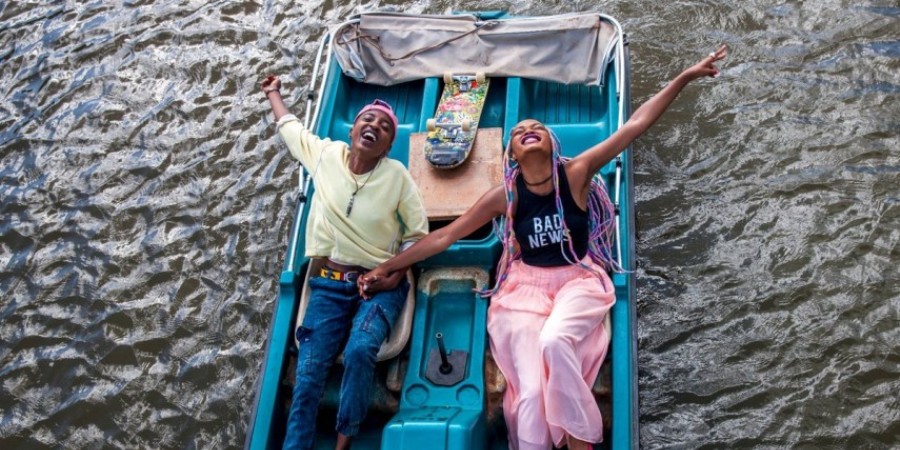Rafiki is an absolute success. It premiered at the 2018 Cannes Film Festival—notably as the first Kenyan film to ever be screened there—then subsequently vied to be Kenya’s submission for the Best Foreign Language Film category at the Academy Awards. Although it ultimately was not chosen, Rafiki has gone on to earn love at festivals all over the world. But its reception in its native land was not quite so welcoming.
Homosexuality, specifically gay sex, is a crime in Kenya punishable by up to fourteen years in prison. So, the Kenyan Film Classification Board banned Rafiki due to its queerness and alleged promotion of lesbianism. They would, however, allow it to be released if director Wanuri Kahiu agreed to rework the positive ending so that the protagonists faced consequences for their supposed immorality. Essentially, the Board demanded a bleaker conclusion where love loses, because prejudice.
Kahiu refused. Rafiki was thus banned, and Kahiu sued. The Kenyan judicial system partially overruled the Board and permitted the film a modest window of time to screen to sold-out audiences in Nairobi (reportedly earning more than Black Panther.) This granted Rafiki an Oscars-qualifying run, but Kenya instead submitted another film, which did not get nominated.
Rafiki is about two women’s struggle to love each other in a homophobic society. Kena (Samantha Mugatsia) and Ziki (Sheila Munyiva) encounter not only the objections of their conservative community at large but also obstacles stemming from their complicated family situations, too. Chiefly, their fathers are opponents in a local election. Romance aside, this alone makes it difficult for them to be acquainted in public, in a very Montagues and Capulets fashion.
In Swahili, “rafiki” means friend. For queer people, it’s often safer in certain situations to refer to one’s romantic partner as only a friend, no matter how significant the relationship. And at first Kena and Ziki’s neighborhood views them as merely such, two newfound friends naturally brought together through the rivalry of their fathers. The notion that the bond between these two adult women could run any deeper is initially overlooked by even the nosiest town gossips.
After all, this is an actively anti-gay environment, as demonstrated by the treatment of an effeminate unnamed townsman, who’s continually ridiculed and occasionally reappears on screen adorning a freshly bruised face. It’s never confirmed whether or not he is in fact gay, but the perception is all it takes for his wellbeing to remain in jeopardy in this ultra-heteronormative, patriarchal culture.
Despite Kenya’s flaws, Kahiu clearly has an undying love for her country. The cinematography and production design are totally lively—vibrant colors, dynamic patterns, fierce textures. And all of it is underscored with a kinetic Afro-pop soundtrack, sensually eliciting feelings of joy similar to what Kena and Ziki feel for one another. Mugatsia and Munyiva’s affection and their fight to live as their real selves are beautifully conveyed through their remarkable, naturalistic performances.
The underlying message of the film—and Kahiu’s purpose in making it—is to say that hope is not lost for Kenya. That optimism doesn’t go unchecked, though. As a filmmaker, Kahiu definitely does not shy away from the inherent dangers of being an other. These characters experience persecution, violence, and a casual exorcism (seriously) just for being who they are. It’s rough, but entirely necessary to the narrative; Kahiu keeps it honest without going gratuitous.
Although the content may feel familiar on a surface level, the societal context makes it unique—and cannot be removed from the conversation. Yes, at its core, Rafiki is a humble romance story that maybe we’ve seen before, conceptually: a slice-of-life film about star-crossed lovers whom society claims shouldn’t be together, but are anyway. But let’s not forget that this film hails from a place where this kind of love is not only frowned upon—it’s aggressively criminalized.
Rafiki is civilly disobedient cinema. Even when matters seem hopeless, even when things seem as dark as they can possibly get, the colors remain—growing in brilliance, rising in luminosity. No one can take away what Kena and Ziki have, or who they are. The fact that many societies still try, though, is a huge part of what makes this film so necessary. Wanuri Kahiu made a film to make a point, a point her motherland heard loud and clear. And, now, so do we.

